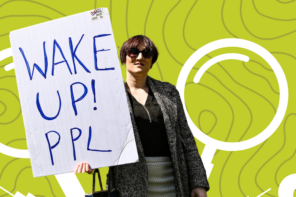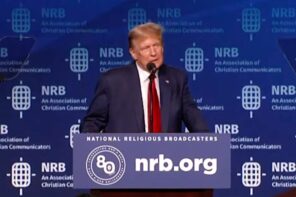Welcome to “Phoning It In,” a gameshow I made up because I am tired and busy but also like to learn about new books!

Wild Experiment: Feeling Science and Secularism after Darwin
Donovan O. Schaefer
Duke U. Press
June, 2022
The point of this exercise (aside from letting me chat with smart folks about cool-sounding projects) is for the author to help me, and by extension you, understand the most important parts of their work without getting bogged down in the particulars.
The particulars matter! If you have the time and the funds and the energy, you should read this book closely, as I know enough about the author to trust that their work is insightful and engaging even if I definitely didn’t give it the attention it deserved! But look, it’s been a long pandemic, okay? Let’s start with the essentials and worry about the rest later.
Today’s “Phoning It In” contestant is Dr. Donovan O. Schaefer, Assistant Professor of Religious Studies at the University of Pennsylvania and the author of Wild Experiment: Feeling Science and Secularism after Darwin (Duke 2022). You can read the introduction for free courtesy of Duke University Press.
This interview has been edited for length and clarity.
Challenge 1: Can I correctly identify the argument based on the very poor reading I did of the introduction.
MPG: If I’ve understood your argument correctly based on the very shitty job I did reading your introduction, you’re suggesting that thinking and feeling are not separate. And that matters because it changes how we should think about secularism and science.
DOS: Yeah. Nailed it.
MPG: [Awards self one (1) gold star, even though the game is made up and the points don’t matter, leaves Donovan to award himself whatever stars he feels he deserves at this juncture; I don’t know his life]
***
Challenge 2: Can I—an eager but perhaps, uh, overcommitted and therefore slightly distracted reader—understand key concepts in the book without looking at the book.
MPG: I identified three core concepts, because you were a very considerate writer and italicized them for me: sense of science; conspiracy theory; and racialized reason. What are these? Why do I care?
DOS: When you’re talking to somebody who is neck-deep in conspiracy theory, do they change their minds when you give them new information?
MPG: They do not. In fact, trying to fact check a conspiracy thinker can further entrench the thinking.
DOS: Right! Because the mechanisms that are making conspiracy theory convincing are not strictly informational. There are all of these other aspects to it, including felt aspects. Conspiracy theory is about arranging ideas in a particular way that allows [the thinker] to feel a certain way. And at exactly the same time [conspiracy theory] is about a particular feeling organizing the information. You sustain yourself in this emotional space and that’s what makes the ideas line up in a particular configuration.
MPG: I’m going to apologize for asking this question but I am going to ask it: this language of feeling a particular way, of sustaining oneself…is conspiracy theory a kind of self-care?
DOS: Ooh, I love that. Is conspiracy theory an affective technology, a thing that people do to create particular feelings? Absolutely.
One of the things I’m really fascinated by is…when we were teenagers, it was never really my thing, but I knew lots of people who loved conspiracy theory. It was fun! You’d listen to Art Bell; you’d listen to “Coast to Coast.” It was kind of innocent! And it was just a little bit weird, kind of funny that people would get so into this—but it was also kind of cool, and you wanted to play along a little bit. But you’d read it in the way that you read YA fiction.
MPG: As I still do.
DOS: And here we are 20 years later, and somehow the comic books have become a political reality. People are treating these conspiracy theories as incredibly live, political facts. So how did that happen?
I don’t have a genealogical account [of conspiracy theory], but I think that in order to understand them, we need to look at their emotional structure. But I’m also really not interested in saying conspiracy theories are emotional and therefore they’re the opposite of reason.
I make the argument that science itself is also driven by emotions. Sometimes that’s why science works—because our emotions help us learn about the world. And sometimes it’s why science doesn’t work, because you’re Samuel Morton and you’re actually really invested in the idea that whites have superior cranial capacity. So you end up in the situation where you’re identifying the emotional elements of conspiracy theory, but you’re also identifying the emotional elements of science. There’s no version of rationality—including scientific rationality—that doesn’t have emotion driving it forward. That’s the sense of science.
So if I’m teaching my students, I’ve always got a few scientists in the class. I say: “Scientists, how does it feel when your experiment works?” And their eyes, their faces light up! They love it, because it’s so exciting! And we feel it too! How does it feel when you’re like “oh my god, this book that I’m reading is just killing me softly—it’s telling a story that I needed to know!”
***
Challenge 3: A critique of the book that has absolutely nothing to do with the substance of the book.
MPG: Why isn’t this book two books? It’s huge. It’s ginormous. It’s very accessibly written, but it feels like there could be a tension between “accessibly written” and “three hundred and ten pages.”
DOS: Surely you and I have convergent limitations in writing too much.
MPG:

DOS: The initial version of this manuscript was 157-thousand words. [Explains that the press agreed but wanted it cut to 100-thousand words.] I bargained her up to 110 by—and I’m not joking here—saying “I deliberately wrote this book using shorter words. I did a word count on the introduction of my first book with Duke, and then I did a character account, and I divided the character count by the word count to come up with the average number of characters per word. And then I did the same with this introduction and I proved mathematically that my words were on average 20% shorter in this book.” That’s how I got 10,000 extra words from Duke.
MPG: [Makes furious notes for future editor scheming, awards Donovan several gold stars for cunning use of long division]
***
Challenge 4: In which I try to deflect attention from not having read the book by asking a question I think makes me sound clever
MPG: Racialized reason is another one of these core concepts in your book. If I’m understanding correctly—who can say, I did a shitty job of reading it—you’re thinking about racism as affect. Does this preclude an understanding of racism as systemic oppression? Because my quick glance assessment was that this feels really individual to me, and I’m worried about the way that it could be operationalized politically.
DOS: Totally, I talk exactly about that. I’m really interested in the relationship between micro and macro—things that people do in their day-to-day interactions scale up. They have political resonances, just as the kind of macro level political structures that surround us all the time…have individual resonances.
Sharon Patricia Holland’s Erotic Life of Racism…basically says we need to take critical race theory’s emphasis on the way that systems are created, maintained, and consolidated at the level of the mundane—our everyday ordinary interactions—and combine it with queer theory’s attention to pleasure, pain, and feeling. So we need to see how these everyday ordinary interactions are constructing, and are also being shaped by, macro level, overarching structural systemic racism. So I was very sensitive to that.
I totally understand that that’s something that could be weaponized in a particular way and try very hard to avoid that. Of course we need to pay attention to macro level structures of racism. And we need to make sure that we don’t create an excuse structure where people can be like, well I’m not doing racist things, therefore I’m immune to racism. But in order to really understand how racism works, we need to have a more multi-dimensional account of it.
MPG: And how does racialized reason connect to queer theory?
DOS: I’m not really sure that it’s my place to claim queerness for a project like this anymore. Maybe once upon a time, when I was closer to grad school…
MPG: Weren’t we all queerer in grad school?
DOS: [Humoring me] Totally. But I do primarily rely on queer of color theorists to devise the theory of racialization that I offer in Wild Experiment—those thinkers are very much at the foreground of the idea of racialized reason.
MPG: And this question of rationality v. irrationality that overarches your project is deeply gendered, of course. Say, where is gender in this project?
DOS: I took a grad seminar with Linda Alcoff at Syracuse on feminist epistemology. That was the seed of this book. This comes out of a particular feminist genealogy of like Genevieve Lloyd, Susan Bordo, Alison Jaggar, Donna Haraway, Sue Campbell… In much the same way I’m drawing on the resources of queer theory, I’m drawing on the resources of feminist theory, but I’m not really talking about gender directly. Even though I think you’re right to say that the extent to which gender and race are made in part by dividing people into rational and irrational categories—that’s definitely right on the surface of this [project].
MPG: [Awards Donovan a gold star ironically for putting up with my queer nonsense through the entirety of lunch/this interview]
***
Question 5: In conclusion, I did not read the conclusion
MPG: Your epilogue, which I did not read, is called “From Creationism to Climate Denialism.” What does this project have to do with climate change?
DOS: One of the things I realized while I was writing the book was that I was trying to think about persuasion. I was trying to think about why it is that two people can look at the same information and respond to it in very different ways—with skepticism or with acceptance or whatever… That’s what you need to take affect into account for: thinking and feeling are a weave—they’re a cat’s cradle; they’re all linked together. So when you change how somebody feels, you’re changing how they think. And when you change how they think, you’re changing how they feel. That, in essence, is persuasion.
MPG: Is it right to understand that in terms of showing folks what their personal stakes are in climate crisis?
DOS: Sometimes. There are a lot of different ways that we need to be talking to people [about climate crisis]. We need to step away from the assumption that people are totally rational and totally determined by facts, therefore the solution is just to throw more facts at them. But I also think we need to step away from the claim that some people are totally irrational and are just totally immune to facts.
What I wanted to do is get people to see climate change as this incredibly urgent zone where we need to be thinking much more carefully about how we persuade. But at the same time we need to step away from this binary sense of the pure strict rationalist—like, people will respond if we give them facts—and also move away from the idea that nobody listens to facts anymore and it’s all about propaganda. I don’t think that’s right either.
Final Score: Everybody wins when we learn more about religion! Congrats, y’all.






